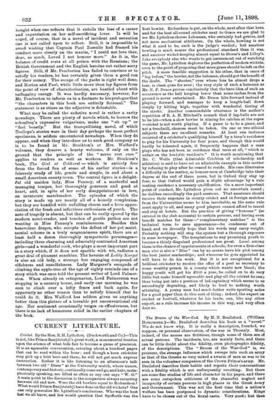CURRENT LITERATURE.
Cricket. By the Hon. R. H. Lyttelton. (Duckworth and Co.)—This is not, like Prince Ranjitsinhji's great work, a monumental treatise upon the science of what bids fair to become a game of precision. It is an agreeable conversation, covering about a hundred pages that can be read within the hour ; and though a keen cricketer may pick up a hint here and there, he will not get much express instruction. Rather it is like listening to an afternoon's talk between two old " Blues" at the University match, where names, contemporary and historic, continually come and go, and hats, meta- phorically speaking, are lifted as often as any one says "W. G." A main point in the discussion is the comparison always recurring between old and new. Were the old bowlers equal to Richardson ? What would Prince Ranjitsinhji have done on the old wickets? One can only generalise Mr. Lyttelton's conclusions. Who was the best bat we all know, and few would question that Spofforth was the best bowler. Richardson is put, on the whole, next after that hero, and for the best all-round cricketer next to Grace we are glad to see Mr. Lyttelton choose Lohmann, who certainly had genius, and not were mechanical attributes. On the whole, bowling is not what it used to be, such is the judge's verdict ; but amateur bowling is much nearer the professional standard than it was, and amateur wicket-keeping almost equal to Storer's and Lilley's. Like everybody else who wants to get amusement out of watching the game, Mr. Lyttelton deplores the perfection of modern wickets, even to the point of proposing that more grass should be left on the pitch. A more feasible suggestion is his other, that in cases of "leg before," the bowler, not the batsman, should get the benefit of the doubt. The "shooter," over whose loss he almost drops a tear, is clean gone for ever ; the very style of such a batsman as Mr. N. F. Druce proves conclusively that the bare idea of such an occurrence as the ball keeping lower than some inches from the ground is never entertained. Mr. Druce hits forward instead of playing forward, and manages to keep a length-ball down simply ty hitting high, together with wonderful timing of the stroke. Another commendable utterance is the author's repetition of R. A. H. Mitchell's remark that if leg-balls are not to be hit—when a slow bowler is aiming for catches at the ropes —cricket is not worth playing. If a game is to be a game, and not a treadmill, chances must be taken. On one or two ethical subjects there are excellent remarks. At least one instance occurred of a cricketer's qualifying himself by a term's residence to play for his University for four years, and though this would hardly be tolerated again, it frequently happens that a man plays who has not been in residence that term at all, "which is unfair on the bonl-fide residents." It is worth mentioning that Mr. C. Wells (that Admirable Crichton of scholarship and athletics) is said to have set an admirable example in this matter by refusing to play after he ceased to reside. His case illustrates a difficulty in the matter, as honour-men at Cambridge take their degree at the end of three years, but in Oxford they stay up four, so that Oxford would gain a slight advantage by a rule making residence a necessary qualification. On a more important point of conduct, Mr. Lyttelton gives out no uncertain sound ; he dislikes exceedingly the paid amateur. That amateurs should receive their expenses in county cricket and in foreign matches from the Universities seems to him inevitable, as the same rule must apply to all, and many good players cannot afford to travel and stay at hotels. But the practice of giving " bmiuses " (so entered in the club accounts) to certain persons, and having even benefit matches for them—" complimentary matches" is the technical term to save appearances—he condemns out of hand, and we devoutly hope that his words may carry weight. Probably nothing will stop the system but a thorough exposure in some newspaper. The temptations to any promising youth to become a thinly disguised professional are great. Least among them is the chance of appointments at schools; for even a. first-class man who is also a "Blue" can by no means have his pick among the best junior masterships ; and wherever he gets appointed he will have to do his work. But it is not exceptional for a brilliant cricketer to receive the offer of a post as secretary to some wealthy person in a county which wants new blood; the happy youth will get his £300 a year, be called on to do very little but make himself agreeable and play all the cricket he can; thus being put into a position of led captaincy which seems to us exceedingly degrading, and likely to lead to nothing worth attaining. A young man had much better write sporting notes for a good paper than do this sort of thing ; indeed, the expert on cricket or football, whatever be his trade, can, like any other expert, as a rule increase his income in this way, and very often does so.






































 Previous page
Previous page